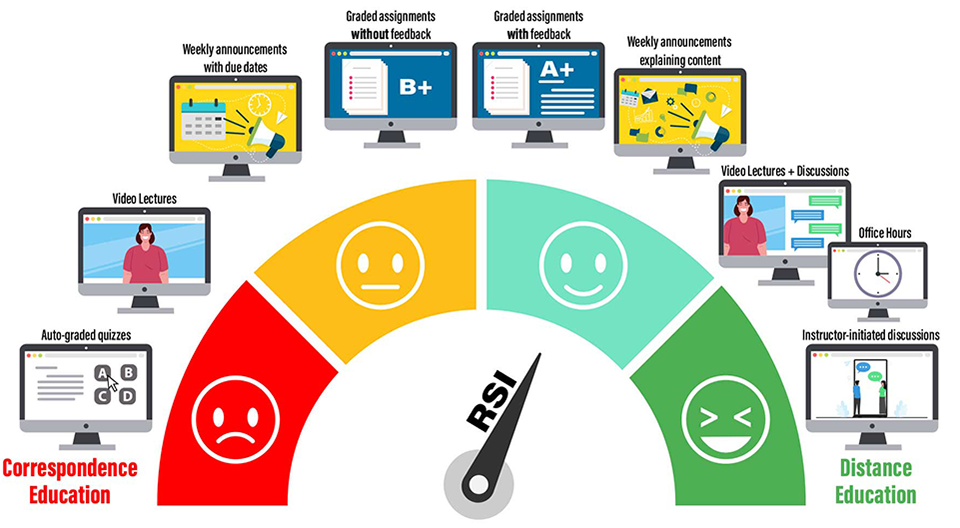What is Regular Substantive Interaction (RSI)?
Regular Substantive Interaction (RSI) is a term coined in several amendments to federal definitions regarding correspondence and distance education (https://www.ecfr.gov/current/title-34/subtitle-B/chapter-VI/part-600/subpart-A/section-600.2). It distinguishes correspondence courses, online courses, and in person courses in terms of the level of interaction and active engagement by instructors for the purpose of maintaining “quality control” of instruction.
Regular and Substantive Interaction Best Practices
Why was this definition added?
One of the primary reasons for the addition of this term was to distinguish correspondence courses from online coursework. It is also an attempt to insure that any that is described as a “fully asynchronous” or “self-paced” does not fall into the same category of online instruction. These types of courses are often provided online, wherein instruction is provided exclusively through pre-recorded lectures and assignments are graded automatically or with low amounts of feedback. The lack of distinction for these sorts of courses caused problems for regulatory bodies, in that entirely online universities could qualify for the same level of funding or support without providing the same level of quality assurance to students.

Which courses should be evaluated using the RSI Evaluation Form?
Online courses or sections that meet entirely online will need to be evaluated to confirm that they are designed in such a way to provide regular and substantive interaction for students. Courses scheduled to meet in person do not need to be evaluated. In the event that a course is adapted from its original in-person format to an entirely online format, the online course should be evaluated using the Online Course RSI Evaluation Form.
Synchronous Online Courses – courses defined as “synchronous” and online should be able to establish regular and substantive interaction by demonstrating the courses meets regularly and the timeline for assignment submissions and feedback are detailed in the course syllabus.
Asynchronous Online Courses – any courses defined as “asynchronous” should be able to demonstrate regular and substantive interaction using the Online Course RSI Evaluation Form. While course meetings may not have a synchronous meeting time each week, the course syllabi and assignment design should clearly demonstrate that posting of feedback, announcements, and lecture material happen on a predictable and regular basis.
Who is responsible for evaluating online courses?
Faculty will complete an Online Course RSI Evaluation Form for each online course in which they are the instructor of record. Any courses adapted to be entirely online should also be evaluated the first semester that they are taught. If no instructor has been fully assigned to a course in need of evaluation, the department chair is responsible for designating an instructor or faculty member to complete the evaluation. All course evaluations should be completed by the 10th day of class for each semester.
The evaluation can be completed using the course syllabus along with assignment details, frequency of feedback, and other materials provided to students in the course.
The Regular and Substantive Interaction Best Practices document should be used as a reference in completing the evaluation form.
Regular and Substantive Interaction Best Practices
Best Practices FAQ
Which kinds of activities in online courses are considering to be regular interaction?
Content-based Announcements: These are announcements that include information about pending assignments that week or provide feedback on work or lecture material.
Threaded discussions of course content with required student-to-student interaction
Instructor participation in threaded discussions: Instructor participation in discussion boards should include feedback or furtherance of ideas provided by students.
Group or individual meetings: Meetings between student groups that are facilitated by the professor, or regularly scheduled one-on-one meetings with students.
Class events such as orientations and workshops: These may be provided on regular basis as enrichment or alternative grade opportunities, and should occur on a regular basis during the course.
Instructor-initiated, scheduled contact via Canvas inbox
Video conferencing or live chat conducting on a regular schedule.
What counts as substantive interaction?
Substantive interaction can be established in multiple ways:
Feedback: Responses or comments that provide students with information about their performance, including what they did correctly and addresses gaps in their knowledge.
Live Lectures: Lectures with active chat or discussion opportunities for students
“Office Hours”: Regularly scheduled time in which students can video/phone conference with the instructor